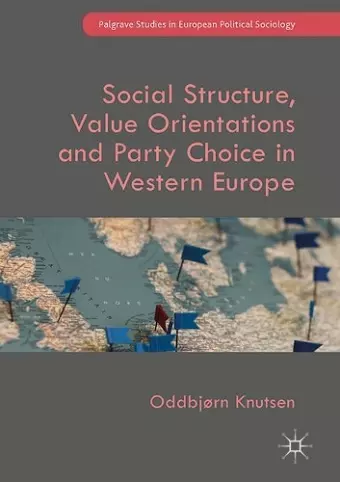Social Structure, Value Orientations and Party Choice in Western Europe
Format:Hardback
Publisher:Springer International Publishing AG
Published:3rd Aug '17
Currently unavailable, and unfortunately no date known when it will be back

"This book offers a very comprehensive analysis of the social foundations of contemporary European party systems. Knutsen artfully assembles data from the European Values Study to describe the persistence and change in the social base of voting behavior. The book demonstrates that social structural influences have not faded away as predictors of voting behavior, but the nature of some alignments has changed over time. This is a very valuable addition to the European voting behavior literature." (Professor Russell J. Dalton, University of California, Irvine, USA) "Knutsen's meticulous probing into public political opinion and partisan choices in 18 European democracies conveys detailed insights into the structure of popular beliefs and partisan alignments at the end of the first decade of the new millennium. He is careful to highlight both common patterns pertaining across the entire set of postindustrial polities as well as persistent differences between groups of countries. Political cleavages are crystallized around structural social divides, albeit they are most sharply configured around party families that did not exist in the post-World War II order. And, pace much talk about political dealignment, it is in the most advanced postindustrial polities that show the strongest structuring of the vote. Knutsen's study may serve as foundation from which much fruitful research can be launched." (Professor Herbert Kitschelt, Duke University, USA)
This book analyses the impact of socio-structural variables, such as social class, religion, urban/rural residence, age and gender, on influencing an individual’s voting preferences. There has also been a shift in value orientations, for example from religious to secular values and from more authoritarian to libertarian values.
This book analyses the impact of socio-structural variables, such as social class, religion, urban/rural residence, age and gender, on influencing an individual’s voting preferences. There have been major changes in recent decades both to social structure and how social structure determines people’s voting behaviour. There has also been a shift in value orientations, for example from religious to secular values and from more authoritarian to libertarian values. The author addresses the questions: How do social structure and value orientations influence party choice in advanced industrial democracies?; To what extent is the impact of social structure on party choice transmitted via value orientations?; To what extent is the impact of value orientations on party choice causal effects when controlled for the prior structural variables? The book will be of use to advanced students and scholars in the fields of comparative politics, electoral politics and political sociology.
ISBN: 9783319521220
Dimensions: unknown
Weight: 5106g
303 pages
1st ed. 2018